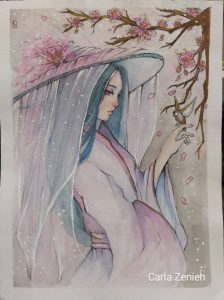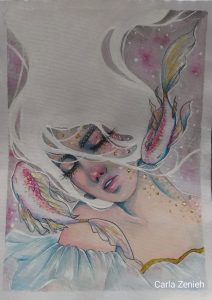Refugee finds comfort in art
As a refugee forced to flee as a brutal civil war engulfed her homeland, Carla Zenieh found solace in art.
Carla and her family fled their home in Syrian capital of Damascus in 2019 finding relative peace and security in the northern Iraqi city of Erbil.
But even there the family faced uncertainty about their future, a lack of work as well as discrimination and racism. And when the COVID-19 pandemic arrived, bringing lockdowns and health threats, things got worse.
“At that time art was an escape for me. In Erbil we faced a lot of problems and challenges and I wanted a way to escape,” Carla said.
“Art was a place for me to escape,” she said.
 Carla, 29, says her art is about “expressing female energy and strength combined with the natural world”.
Carla, 29, says her art is about “expressing female energy and strength combined with the natural world”.
“I started with pencils and moved to watercolours. I wanted more freedom to work with colours,” she said.
“And with watercolours, you can’t completely control how the colours flow and how they combine within an artwork.
“My art creates a peaceful place in a serene world to escape the real world.”
Carla said she started making art when she was six.
“I have always enjoyed drawing and my parents saw that and started to encourage me,” she said.
 “After that I went to University and I chose to do architecture because I love art. There is a lot of artistry in designing beautiful building and that attracted me.
“After that I went to University and I chose to do architecture because I love art. There is a lot of artistry in designing beautiful building and that attracted me.
“But I really started to do art seriously in Erbil where we lived for four years.”
She has posted much of her art on TikTok and it recently featured in a Refugee Week event in South Morang.
Carla, her mother and brother fled Syria because of the conflict.
“We moved from house to house in different parts of Damascus before finally we had to leave and we flew to Erbil,” she said.
After arriving in Erbil, the family spent all of their savings on motels. Carla eventually found work as an architect and they were able to rent a house.
Carla’s mother was not able to work because of a medical condition and her brother was not eligible to attend school.
“He had no friends and he withdrew into himself spending hours on his phone,” Carla said.
Carla and her mother had applied through the UNHCR for ‘women at risk’ visas to come to Australia and they underwent interviews in 2020.
But then the COVID-19 pandemic struck and Carla lost her job and the chance of coming to Australia evaporated.
“It was a really hard time for us. We struggled to live and we were discriminated against. I did all the work at my place of employment but Iraqis who did very little received two times my salary,” Carla said.
She found another job in a beauty salon but was fired again because of COVID lockdowns.
Marshalling her skills and resilience, Carla eventually found work teaching Photoshop techniques.
Carla and her family eventually arrived in Australia in May 2023. But Carla was forced to jettison most of her artworks on departure because her luggage was overweight.
“It was heartbreaking. Some of the artworks were ones that helped me get through the worst times in Erbil when we didn’t know what the future would hold,” she said.
“But I am looking forward to starting life in Australia, continuing to make art and I want to resume my career in architecture,” Carla said.












